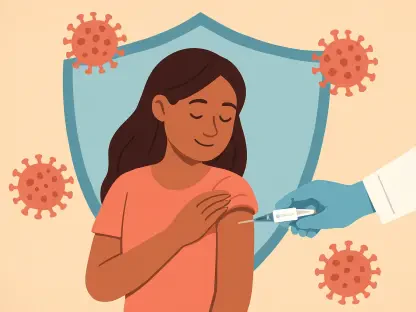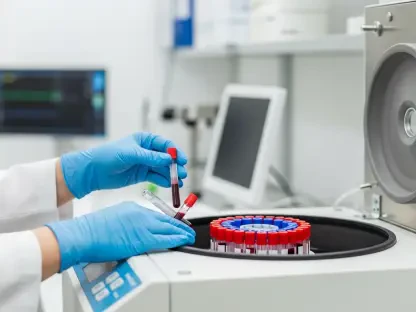A groundbreaking approach promising to revolutionize the treatment of type 1 diabetes has emerged from the research labs of Weill Cornell Medicine. At the heart of this development is islet transplantation, which seeks to restore insulin production in patients by replacing damaged beta cells with healthy ones. The traditional procedure requires injecting harvested islets into the liver of the recipient. Unfortunately, many of these transplanted cells do not survive long enough to function effectively, ultimately compromising the therapy’s success. Researchers have now identified a pretreatment strategy that significantly prolongs the lifespan of these cells, enhancing patient outcomes and redefining the potential of cellular therapies.
Novel Pretreatment Strategies for Enhanced Cell Survival
LIP Cocktail: Transforming the Transplant Paradigm
Researchers have focused on a small molecule cocktail known as LIP, which stands for beta-lipotropin, insulin growth factor-1, and prostaglandin E2. This innovative pretreatment method represents a shift in transplantation protocols. Initial tests on female mice demonstrated promising results, with the transplanted human and beta cells showing improved survival rates when administered subcutaneously rather than the traditional hepatic route. However, the success of this method was not replicated in male mice, indicating a need for specialized treatment protocols based on gender-specific responses. This insight opens doors to more personalized medical treatments that consider individual biological differences, making the therapy more adaptable and effective.
The extension of islet survival translates directly into potential improvements for patients who rely on these transplants for regulating blood glucose levels. The complex interplay between different components of the LIP cocktail supports cellular environments that improve cell viability and function post-transplantation, offering a promising frontier for clinical application. Understanding the cellular and molecular mechanisms that influence the success of these transplants offers significantly enhanced treatment avenues. Moving forward, these findings have the potential to lead to fewer donor requirements and make transplants more accessible to a broader range of patients.
ChemPerturb-SeTailoring Treatments for Better Outcomes
Recognizing the variable efficacy of LIP across genders, researchers implemented an advanced screening technique termed ChemPerturb-Seq. This technique marries chemical screening with RNA sequencing, allowing the identification of the most effective pretreatment molecules for different biological profiles. As a result, ChemPerturb-Seq helped identify an enhanced cocktail, LIPHS, which adds histamine and serotonin to the existing mix. This refined solution showed remarkable success in prolonging islet cell survival in male mice, demonstrating the critical need for treatment personalization.
The introduction of ChemPerturb-Seq represents a significant commitment to harnessing the power of technology to customize medical solutions. By meticulously analyzing patient profiles and tailoring interventions to specific characteristics, the approach boosts overall efficacy and aligns with modern principles of precision medicine. Moreover, the use of ChemPerturbDB for data sharing enhances collaborative efforts among researchers and clinicians, fostering a community focused on innovative solutions. This research underscores the importance of detailed molecular analysis in informing treatment adjustments and advancing therapeutic strategies.
Advancing Regenerative Medicine with New Methodologies
The Path to Revolutionizing Diabetes Treatment
The effort to refine islet transplantation is part of a broader drive to apply regenerative medicine principles rooted in synthetic biology and bioengineering. This research builds off a longstanding need to expand therapeutic options for type 1 diabetes beyond conventional insulin therapy. By pursuing sustainable methods for cell transplantations, the project significantly contributes to developing comprehensive and integrated care models. It further establishes a framework for leveraging molecular biology advancements to devise groundbreaking medical procedures.
The impact of these discoveries extends beyond type 1 diabetes, as the robust methodologies and innovative screening tools can be adapted to treat other conditions requiring cellular therapy. The synergy between multidisciplinary fields such as genetics, biotechnology, and regenerative medicine underscores a collaborative paradigm that could reshape healthcare practices. Ultimately, these pioneering strategies could serve as a template for future advancements in the medical field, promising a wider range of treatment options and improved patient outcomes across various health domains.
Looking Forward: Future Implications and Research Directions
Researchers at Weill Cornell Medicine have introduced an innovative approach that could transform the treatment of type 1 diabetes. This new method centers around islet transplantation, aiming to restore the body’s insulin production by substituting damaged beta cells with healthy ones. Traditionally, this involves the injection of harvested islets into the recipient’s liver. However, a significant challenge is that many of these transplanted cells fail to survive long enough to be effective, which undermines the therapy’s success. To address this, researchers have discovered a pretreatment strategy that substantially extends the lifespan of these transplanted cells. This advancement not only improves patient outcomes but also redefines the capabilities of cellular therapies. By enhancing the durability and functionality of transplanted islets, this innovative approach has the potential to become a pivotal treatment for individuals with type 1 diabetes, facilitating better management of the condition and offering new hope for patients worldwide.









